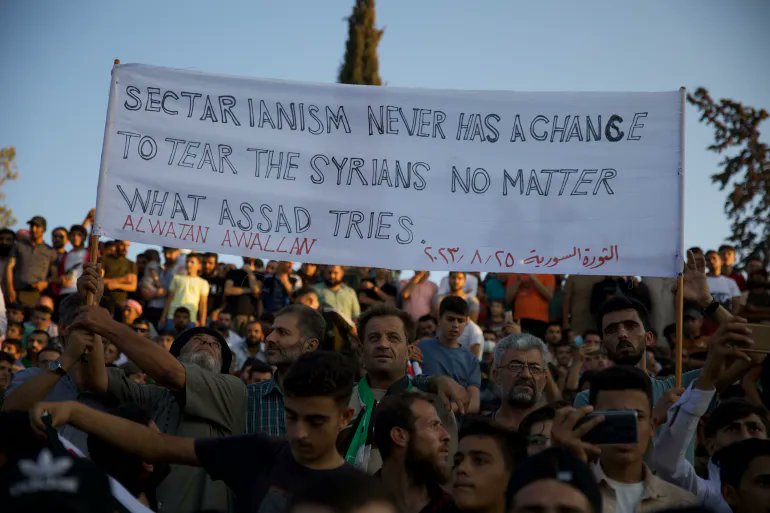Archive for the ‘Syria’ Category
Genocide justifying itself by genocide
The most repulsive thing I saw yesterday was a Zionist justifying the genocide of Palestinians by reference to the genocide of Syrians. Three points.
One: One genocide doesn’t make another OK. Obviously.
Two: Israel was a major reason why the US stopped serious weapons reaching the Free Army. Other than a few rhetorical comments, the US worked with Iran (doing a deal) and Russia (welcoming it into Syria to ‘solve the chemical weapons problem’, which of course it didn’t) to save Assad. This, according to what American officials told Syrians lobbying for weapons, was because Israel was worried about ‘instability’, especially about Syrians having anti-aircraft missiles and heavy weapons. So hundreds of thousands of Syrians were murdered, millions expelled, and the country utterly destroyed, for the sake of the apartheid state’s ‘stability’.
Three: Israel is doing exactly the same to Gaza as what Assad/Iran/Russia did to Homs, Aleppo, the Ghouta, etc: it is destroying the civilian infrastructure, imposing starvation sieges, hitting schools, hospitals, residential blocks, bakeries. Its aim is the same – to remove or annihilate the civilian population. Its genocidal rhetoric is the same, but it seems to be far more deeply spread amongst Israeli Jews than it is amongst Assad’s ‘loyal’ Alawi community. The difference in method is that Israel does the killing faster and more efficiently, with more advanced western (American and German) weapons.
So Israel does the same as Assad/Iran/Russia, only faster, and Israel contributed to the disaster in Syria anyway, and you can’t justify your fascist genocide in the south of bilad ash-sham by pointing to the fascist genocide in the north. You are all fascists, and the people of the region in their overwhelming majority despise you both. There will be no peace until both of your ideologies and murderous power systems are dismantled.
Read the rest of this entry »Syrian Gulag
I’ve written a long essay for a future issue (the Halal issue) of the Critical Muslim which reviews three necessary books on the politics of the Middle East. Two are Alex Rowell’s “We Are Your Soldiers” and Azmi Bishara’s “Syria 2011 – 2013”. Here I’m showing you a few paragraphs on the third book – Syrian Gulag: Inside Assad’s Prison System – because it’s such an essential addition to the Syrian bookshelf that I feel the need to publicise it. Nobody should pontificate about Syria before making themselves familiar with this material.
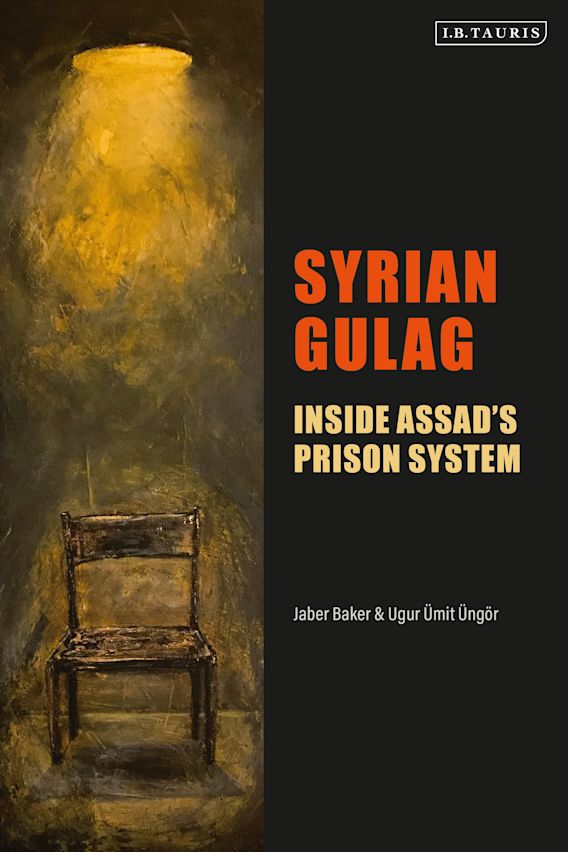
To better understand the history of the strong man, or the taghout, in Syria, let’s return to the country’s torture chambers, which became more numerous and more politically salient in the days of the UAR. Some years later, Hafez al-Assad further expanded the detention and torture network, to the point that the entire Syrian society was governed, and smothered, by the fear of detention and torture. The misrule of the supreme strong man was underpinned by hundreds of little strong men abusing people in prisons.
The US incarcerates 629 people per 100,000 of the population. This is generally considered to be the worst rate in the world. Russia incarcerates 445 per 100,000. In Syria, however, 1,200 per 100,000 are incarcerated. That’s a conservative estimate. And many of those who are taken “behind the sun”, as Syrians say, never return.
I’ve taken those figures from Syrian Gulag: Inside Assad’s Prison System by Jaber Baker and Ugur Umit Ungor. This is an immense work, based on over 100 interviews with survivors, some interviews with defected perpetrators, leaks – including the ‘Caesar’ photos of at least 6,786 people murdered in detention – as well as reports by international organizations, a vast archive of torture accounts held by a Dutch immigration lawyer, and published and unpublished prison memoirs. Prison literature (adab as-sijoon) is Syria’s most developed genre, very unfortunately.
Syrian Gulag is encyclopedic, organizing information on the different types of prisons, the various branches and their histories, and the officers who built the system. In so doing, sadly, it gives a history of the last sixty years in Syria. What’s surprising here is the petty sadism of the top-level, household-name officers, their willingness to get their hands dirty. The people in charge are thugs, quite literally. And what is wearily familiar here is the taghout’s tactic of turning meaning on its head. The “Palestine Branch” sounds like it does exciting espionage on Israel, but is in fact a torture camp for the abuse of Palestinians and Syrians.
The torture methods described are numerous and heart-shattering. They include “the German Chair”, “the Dynamo”, tying the penis, sleep deprivation, electrocution, “the Magic Carpet”, “the Ladder”, burning with charcoal, burning with hot water, fingernail extraction, drowning, “the Parachute”, “the Pyramid Pose”, cutting with knives, and rape. Remember, these horrors are not freak occurrences. Almost every Syrian family has encountered them.
Read the rest of this entry »Khaled’s Death is Hard Work
A slightly different version was published at The Markaz Review.
I remember Khaled in a beer garden in Bristol. He was sitting at a table performing the English language: “So so so,” he sang. “And and and, but and but! and so… but! so… but!” Khaled inhabiting his stocky body, his warm, brimming smile, his big head of fluffy white hair.
Of course he knew far more words than those. He somehow managed to communicate very well in English without speaking it very fluently. In Arabic he talked and talked, like the tide. Sometimes he broke into song. His writing was brilliant, the kind that will last for many generations. A poet, screenwriter, novelist — he was endlessly playful with words. And he was gentle with life, and with people. He took them very seriously.

I was with him at the BBC one evening in June 2014. ISIS had captured Mosul, and using the money looted from the city’s banks, and the American weapons captured from the fleeing Iraqi army, the organization had rapidly seized vast swathes of eastern Syria, areas which had been previously liberated from the Assad regime. The radio presenter asked Khaled what he thought of it all. His answer — “It’s important to pay attention to the role of Iran” — may have confused non-experts at the time, but was absolutely apt.
He was politically acute, although he wasn’t primarily a political person. He was a humanist, an artist, and a Syrian who cared deeply about Syrians. Once, as we toured England to introduce the Syria Speaks anthology, Khaled met refugees from villages near his own in the Aleppo countryside. “They asked me about the olive trees and the seasons,” he grinned afterwards. “I love these people.”
He liked the concrete, material detail of life, and was aware of the dense social webs connecting people. This comes through in his writing, in its sensuousness and physicality as well as in its careful intricacies of plot and character. His novels are beautiful and rewarding, but not always easy reading. The stories often proceed in narrative swirls and mosaics rather than in linear fashion. This form manifests a kind of realism, because in real human life everywhere, not only in Syria, characters are woven from stories, and stories link to further stories …
Read the rest of this entry »Revolutionary Resurgence in Syria
Just a couple of points:
Twelve and a half years on, days after the tenth anniversary of the sarin slaughter in the Ghouta, that is a decade after Syrians lost all reason to hope…
As in the first years of the Syrian Revolution, people of all sects and social backgrounds are coming together to demand freedom and dignity. Over a decade of fierce sectarian counter-revolutionary violence hasn’t changed the basic demands of the Syrian people.
Protests are rising throughout southern Syria, in Daraa and Sweida provinces. As if this were 2011 reborn, there are massive popular demonstrations in regime-controlled territory. They’ve been met by solidarity demonstrations in eastern Syria: in Deir ez-Zor, and in Raqqa in PKK/PYD/SDF territory; as well as in the liberated areas of the north. The chants and lyrics of greeting and solidarity exchanged between the various regions of the country feel like a fresh breeze after the years of engineered sectarian and ethnic breakdown.
Syrians have been disappointed so many times before that it seems foolish to continue hoping. And yet, there are two new elements to the situation today. First, the entire Druze community – centred on Sweida – appears to be rejecting Assad entirely.
Individuals from minority communities have opposed Assad previously, but not a minority community en masse. The Druze of Sweida tolerated Assad so long as his forces kept their distance, and so long as young Druze conscripts served in the province rather than went to fight other Syrians. And the community sheltered defectors and others on the run from Assad’s killers. But it didn’t stage mass protests, nor an armed uprising, even as the Sunnis in neighbouring Deraa province were tortured, shot, and bombed. Assad’s main strategy has been to slaughter, rape, torture and expel Sunnis in particular, and to scare minority groups to sell them the lie that only Assad can protect them from the Sunnis. So mass protests of Druze are particularly difficult for Assad to deal with.
It looks like these protests won’t be stopped without massive violence. But massive violence against a minority sect ruins the pretext of the regime being a ‘protector of minorities’. It emphasises the unity of the Syrian people. Assad can’t survive a meeting with a unified Syrian people. Hence the slogan once again rising: One, One, One, the Syrian People are One.
Second,
Read the rest of this entry »Lesson from Iraq and Syria
Everybody’s asking what lessons can be learned from Iraq twenty years after the invasion and occupation. But more can be learned by looking back further, to 1991.
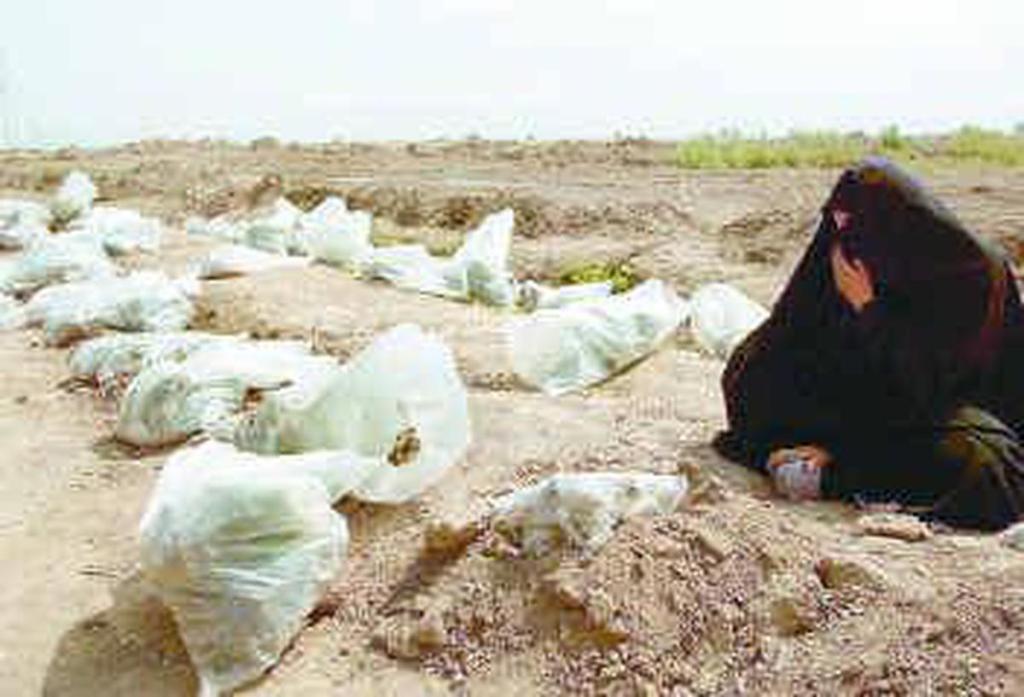
I’ve just listened to the two episodes on the The Rest is Politics podcast in which Rory Stewart grills Alastair Campbell on the 2003 invasion. It’s a fascinating discussion which I recommend listening to, but there are some glaring omissions. First, there’s lots of talk about British military casualties and the effects on western politics in the years since (and good they mention the Iraq hangover’s role in the west’s criminal inaction in Syria), but not much talk on the hundreds of thousands of dead Iraqi civilians. Next, and most importantly, there is no mention of the American decision in 1991, after driving Iraqi forces from Kuwait, to not only leave Saddam in office but to give him permission to use helicopter gunships to put down the uprising in the mainly Shia Iraqi south.
That was the time to remove Saddam from power, not as a remotely decided regime change, but in support of a population that was already rising against the tyrant. At that key moment, America (and its allies) decided to NOT protect the Iraqi population. America had soldiers right there in southern Iraq watching as Saddam’s forces massacred civilians and filled mass graves. The reason for this was probably fear that Iran would take advantage – but if this terrified decision makers then into such immoral behaviour, why in 2003 did British and American decision makers not bother even considering how Iran would take advantage of their invasion? Of course the end result of the 2003 invasion was the takeover of Iraqi institutions by Iranian-run militias. This was the key factor in the rise of ISIS and then the consequent war to destroy the so-called ‘caliphate’.
So in 1991, after destroying the Iraqi army and liberating Kuwait, the US chose to allow Saddam to slaughter the southern Shia. Then it imposed ruinous sanctions which destroyed the Iraqi middle class. Sectarianism became much worse as Saddam used loyal Sunni troops to massacre Shia, and as he turned to sectarian rhetoric to shore up his damaged rule. By 2003, when the US and Britain decided to invade for their own reasons, on their own timetable, it wasn’t surprising that the place soon collapsed in civil war.
Read the rest of this entry »Palestinian Assadists
There’s nothing more ridiculous than a Palestinian Assadist. For western Assadists, the Arab world is a blank on which to project ideological fantasies. But the Palestinians are part of this world. So what makes some repeat inhuman and absurd Assadist propaganda?
How has the Assad regime under father and son won such loyalty? Is it because in 1967 Hafez al-Assad, then defence minister, ordered the Syrian army to retreat from the Golan before any Israeli soldiers had turned up? So the Golan was handed to Israel, which then annexed it. Or is it because in 1973 Hafez al-Assad, now in absolute control, lost another war (not surprising given his endless purges and rabid sectarianization of the army) but spun the defeat as a historic victory and proof of his nationalist genius? Perhaps it’s because early in the Lebanese civil war, the Assad regime, which had loudly proclaimed its support for the Palestinian/Muslim/leftist alliance, intervened, but on the side of the pro-Israel Maronite Falangists to defeat the Palestinian/Muslim/Leftist alliance? Or could it be because throughout the 1980s the Assad regime slaughtered tens of thousands of Palestinian civilians in camps in Lebanon, most notably at Tel Za’atar? Perhaps it’s because the regime under Bashar utterly destroyed Yarmouk camp, until then Syria’s most important centre of Palestinian culture. Or because the regime tortured and starved so many Palestinians to death during the Syrian Revolution. Or maybe Assadist Palestinians love the regime because its reign has seen all of Syria parceled out to foreign powers – Russia, Iran, the United States, Turkey, the Turkish-Kurdish PKK, as well as the part it had already handed to Israel. Perhaps they believe the destruction of Syria’s cities, the murder of a million Syrians, and the expulsion of millions more, will in the end hasten the liberation of Palestine.
I should say that very many, probably most, Palestinians sympathise with the revolutionary Syrian people and not with the regime (and its allies) killing them. The more working class and more religious the Palestinian, the more this is the case (in my experience). And among liberal middle class activists there are many decent people who have shown solidarity with Syrians. Here’s a great statement by some of them from 2016. But some of the signatories were ostracised by other Palestinians for signing. Amongst the West Bank middle classes, including not a few faux-intellectuals, there’s plenty of Assadism. There’s also, for God’s sake, the statue of Saddam Hussein at Bir Zeit.
Why is it that this kind of Palestinian, the very kind who in previous decades we might have considered as being at the forefront of radical politics in the Arab world, has become enmeshed in such backward and inhumane modes of thought? It might be because the Palestinians haven’t experienced the revolutionary wave of the Arab Spring. This isn’t really their fault. They are stuck with the old nationalist narratives because they are stuck with a foreign occupation. Whereas their neighbours have moved on to postcolonial struggles. The foreign occupations have gone (or had gone, before Assad brought them back), so the struggle now is against those gangsters who seized control of the weakened countries the colonialists left behind.
Read the rest of this entry »‘It can’t get any worse.’ And then the earthquake…
(A lightly edited version of this piece was published by Dawn Mena. At the bottom of this page there is information on who to donate to.)
Syrians wanted to be known for their contributions to civilization, as they were in ancient times. Syria is part of the Fertile Crescent where agriculture began, where the first cities were built, where the first states developed. The first alphabet (Ugaritic) was thought up in Syria. The country produced Roman emperors and, under the Umayyad dynasty, became the first centre of a new ‘Islamic world’. When Syrians achieved independence in the mid 20th Century, they hoped their modern accomplishments would echo the old. As a diverse, cultured, hardworking people who valued education, and who tended to excel in business when abroad, they had good reason to hope this would be the case.
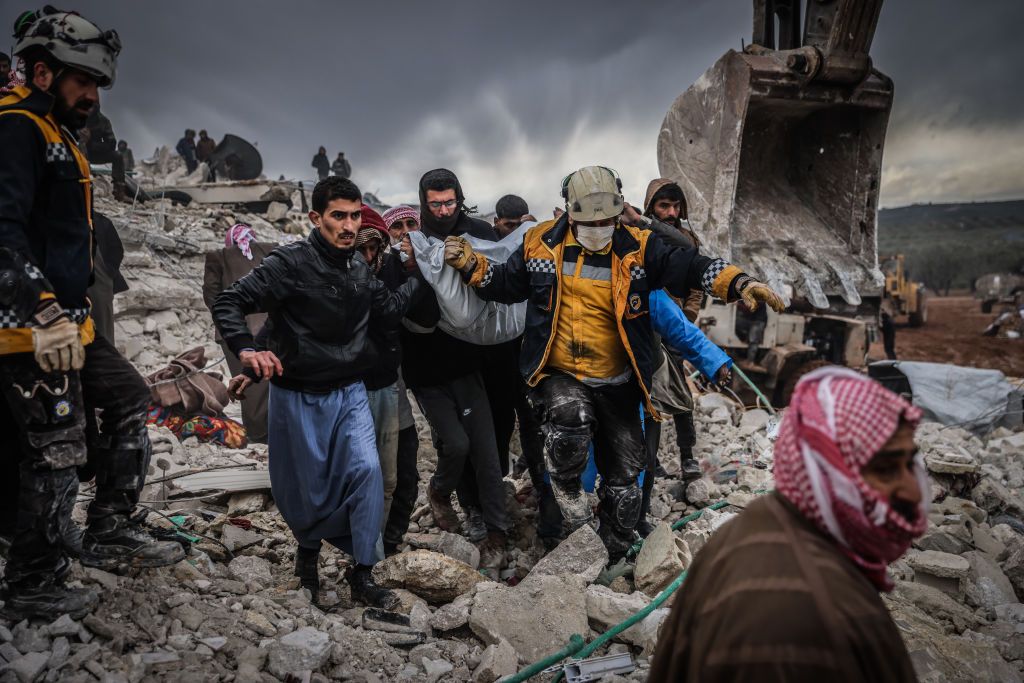
But like so many post-colonial states lacking strong institutions, modern Syria soon fell into a cycle of military coup and counter-coup, ending with the Baathist dictatorship which has tortured and plundered the country and its people since 1963 – and under the Assad family since 1970. In 2011 Syrians rose in revolution against the Assad regime, and would have liked then to be recognized for their revolution’s successes. For years they resisted the most extreme oppression, and even under the bombs managed to build hundreds of democratic local councils. They also managed to avoid falling into sectarian civil war, despite the provocations. Sunni and Alawi villages didn’t attack each other. The sectarian massacres had to be organized from on high, first by the regime, then by ISIS, the regime’s dark protégé.
But the Assad regime was rescued by Russian and Iranian imperialists, and by the West’s appeasement of these imperialists. The democratic Syrian Revolution was defeated by force of arms. Worse, it was ‘orphaned’, to use Ziad Majed’s term. Beyond Syria it was ignored or misrepresented, particularly in the West, by the Kremlin’s leftist and rightist useful idiots and a wider public prepared to believe the worst of a mainly Arab and mainly Muslim people.
So now Syrians have become known internationally not for their history, nor their modern success, but for the extremity of their suffering. Their pains under dictatorship were bad enough, culminating in the 1982 Hama massacre when at least 20,000 were murdered, but multiplied after 2011 when the full force of local, regional and international counter-revolution was deployed against them.
Read the rest of this entry »Ukraine, Syria, Russia and ‘anti-imperialism’
My good friend Mira Krampera interviewed me at length in Czech on Russian imperialism in Syria and Ukraine, and western and global responses to the crisis. Here’s the interview in Czech. And here is an English translation. And now… here it is in Polish. And now in English in Antidote Zine.
The Left’s Syrian Failure
I’ve found a video of me criticising the left’s failure to understand Syria. The crude binarism, the ignorance, the conspiracy theories, the war-on-terror rhetoric, the racism. The talk is from Oslo in late 2016, but I think it’s still very relevant today. Since 2016 the crisis has intensified and spread. Cities are burning in central Europe, climate change is galloping, and we’re still playacting oppositional politics. Here it is:
Irrationality
Over the last two weeks very many people have asked, is Putin rational? Worse, many have argued that Putin used to be a pragmatist, a master strategist, but that he’s suddenly gone mad.
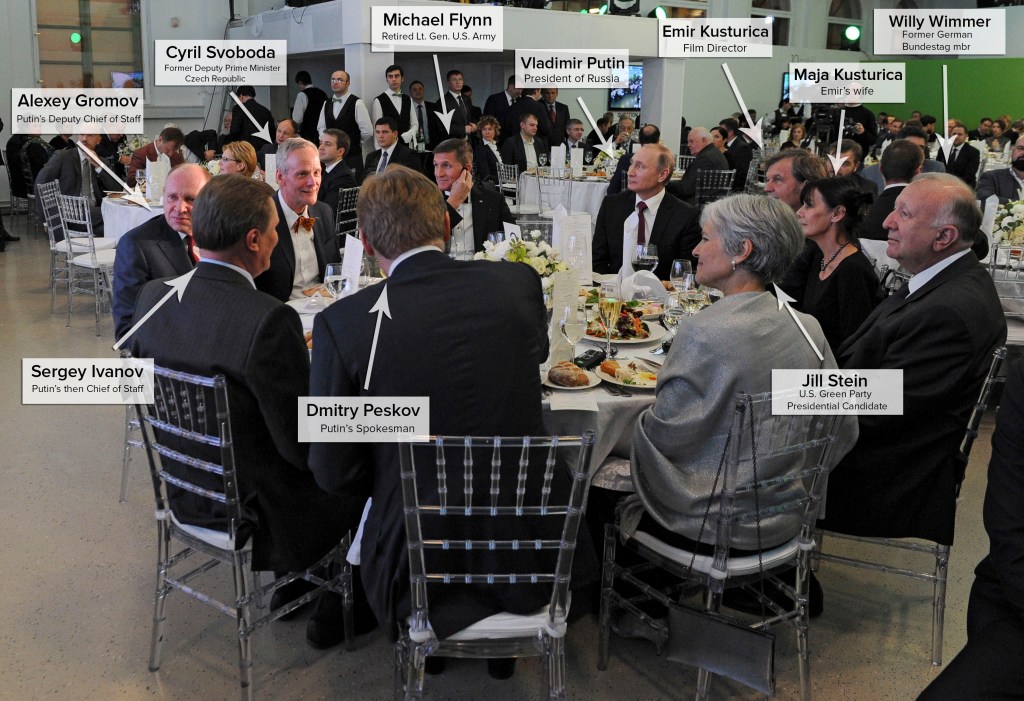
In 1999 Putin was a little known prime minister aiming to become president. Then a series of bomb attacks destroyed residential blocks in Russian cities, killing hundreds. Many insiders blamed Putin and the FSB intelligence services for the attacks. One such insider was the defected FSB agent Alexander Litvinenko, who Putin’s men consequently murdered in London (in 2006). The FSB obstructed all attempts to investigate, so its guilt has never been proved. Observers must make up their own minds. There are many good sources of information on the topic. I first came across it in Masha Gessen’s excellent book “The Man Without a Face: The Unlikely Rise of Vladimir Putin.”
What happened next is not controversial. Putin blamed the blasts on Chechen terrorists, and on that pretext reinvaded Chechnya. The Chechen capital Grozny was leveled and tens of thousands of civilians were killed.
Was this behavior rational? Well, it worked. It made Putin very popular in Russia, easing his succession to the presidency. It established his reputation as a patriotic strong man. It quelled Chechen independence.
Read the rest of this entry »A Labyrinth of Suffering
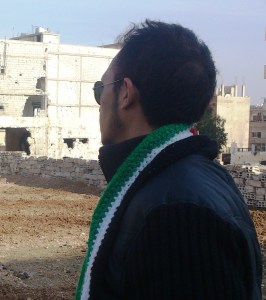
Kassem Eid in Moadamiya
(A slightly edited version of this article – which reviews books by Alia Malek, Rania Abouzeid, Kassem Eid, and Marwan Hisham and Molly Crabapple – was first published at Prospect Magazine. If you’re interested in more Syrian perspectives on the revolution and war, I recommend Wendy Pearlman’s oral history – my review here – Yassin al Haj Saleh’s brilliant political writing – my intro to the book is here, Samar Yazbek’s books – Woman in the Crossfire reviewed here, and The Crossing reviewed here – and of course our book Burning Country, which gives a grassroots account – information on that here.)
“Syrians. I hated the deceptive simplicity of that word. We were twenty-three million people. Soldiers and fighters. Revolutionaries and counter-revolutionaries. The torturer and the victim. How could one word encompass us all?” – Marwan Hisham
…
Escorted by Russian bombers and Iranian militia, the Assad regime has returned in recent months to key parts of the Syrian heartland. In its wake come deportations, mass arrests, torture and field executions. Secure in its impunity, the regime has begun issuing death notices for the tens of thousands murdered in detention since 2011. President Putin calls for the regime’s ‘normalisation’ against this backdrop, and in the run-up to the Helsinki summit, it seems he won Donald Trump and Benjamin Netanyahu’s acquiescence.
The democratic revolution is defeated, the country destroyed, and what follows will not resemble peace. Assad’s throne has been saved, but at the dual price of Syrian social cohesion and regional stability. From the originary counter-revolutionary violence, secondary and tertiary conflicts now bloom – Sunni-Shia, Turkish-Kurdish, Israeli-Iranian – while refugee flows and terror scares have infected our politics here. Syria will continue to demand our engagement, and not only for the sake of its vast human tragedy.
Of the expanding shelf of Syria books, the most explanatory (or least ideological) tend to start from the diverse experiences of Syrians themselves. Four recently published books do just that, in very different ways.
Both chronologically and socially, “The Home that was Our Country”, by Syrian-American journalist Alia Malek, has the widest focus. It begins at World War One, when half a million Syrians died of famine, and Armenian genocide-survivors arrived from Turkey. The author’s great-grandfather Abdeljawwad, a landowning ‘notable’ and entrepreneur, shelters one refugee before participating in the 1920s uprising against the French – whose mandate brought martial law, aerial bombardment, and an Alawi-dominated army. By turns generous host and manipulative patriarch, equally attached to tradition and modernity, Abdeljawwad is a Christian, school founder, and womaniser.
Every character in these densely populated pages is as complex. After grandmother Salma – a heavy smoker called ‘sister of men’ – moves to multicultural Damascus, the fates and interactions of her relatives and neighbours illustrate the declining fortunes of society-at-large, as the imperfect post-colonial democracy is succeeded by coups and counter-coups, then the Baath’s one-party state, and finally Hafez al-Assad’s one-man party. Now people (including Salma’s brother) disappear for the slightest dissidence. Their relatives fear asking too many questions. Religious coexistence, once a given, strains under the mutual fear and suspicion built into the new dispensation. Infrastructural stagnation accompanies seeping moral corruption: “If people disregarded anyone’s welfare but their own, it was in part because the state made Syrians feel that everyone was on his or her own; people were being pitted against one another.”
Introducing al-Haj Saleh’s Impossible Revolution

Yassin and Samira
It was an honour to write the foreword to Yassin al-Haj Saleh’s indispensable collection of essays “The Impossible Revolution”. If you haven’t read the book yet, you should. Yassin is perhaps Syria’s most important political dissident, and a thinker of global importance.
Here are some extracts from my foreword:
Yassin al-Haj Saleh is a burningly relevant political thinker. Unlike most of his counterparts, he speaks not only from theory but from a lived experience of repression, revolution, counterrevolution, and war. Objective but never neutral, he is engaged and in tune with the rapid shifts and turns of his tormented society, urgently seeking answers to the most wide-ranging and inclusive of questions, and unearthing more, previously unthought-of questions as he goes.
His context is Syria, where 12 million are homeless, perhaps half a million dead. Syria which, six years into the upheaval, has become a truly global issue. The war Assad unleashed to marginalise and destroy a democratic opposition has given rise to a series of increasingly complicated conflicts, often bearing ethnic or sectarian tones. Fanned by overlapping, sometimes competing foreign interventions, these conflicts have infected the region and the world in turn. Regional and international imperialisms are feasting on Syria. Battle lines and forced demographic changes are fueling a hunger to redraw the maps. The spectre of Syrian refugees and/or terrorists, meanwhile, is shaping America’s domestic politics and helping undo the European Union. As hopes for freedom and prosperity are crushed, new strains are injected into old authoritarianisms, and 21st Century forms of nativism are taking root, west and east.
Yassin speaks from the heart of this turmoil. Yet this in your hand is the first book-length English translation of his work.
It’s been a long time coming.
“They simply do not see us,” he laments. If we don’t see Syrian revolutionaries, if we don’t hear their voices when they talk of their experience, their motivations and hopes, then all we are left with are (inevitably orientalist) assumptions, constraining ideologies, and pre-existent grand narratives. These big stories, or totalising explanations, include a supposedly inevitable and ancient sectarian conflict underpinning events, and a jihadist-secularist binary, as well as the idea, running against all the evidence, that Syria is a re-run of Iraq, a Western-led regime-change plot. No need to attend to detail, runs the implication, nor to Syrian oppositional voices, for we already know what needs to be known.
Purveyors of such myths, the ideologues and regime-embedded journalists, the ‘experts’ who don’t speak more than a few words of Arabic, often seem to rely on each other to confirm and develop their theories. They brief politicians, they dominate opinion pages, learned journals and TV panels. And we the public, to a large extent, rely on them too. We see through their skewed lens, through a certain mythic framework which ‘covers’ the Syrian revolution only in the sense of hiding it from view. As a result we are unable either to offer solidarity to this most profound and thoroughgoing of contemporary social upheavals, or to learn any lessons from it.
Syria Films
I’ve updated this post with links to Syrian-made films, over the fold…
I was interviewed for two documentary films on the Syrian revolution and war. I recommend both (and not because I’m in them).
The Impossible Revolution, by Anne Daly and Ronan Tynan, named after Yassin al-Haj Saleh’s essential book, is particularly good. It tells the story primarily with Syrian voices, and is beautifully made. For those interested, it also investigates the leftist failure to understand or engage with the revolution. You can watch or buy it on Amazon (here’s the UK link), or on Vimeo, here.
National Geographic’s Hell on Earth: The Fall of Syria and the Rise of ISIS, by Sebastian Junger, is also very good. And now on YouTube:
And…. look over the fold for Adnan Jetto’s ‘Jalila’, a Syrian-made documentary about women in the revolution.
A Letter Concerning Afrin
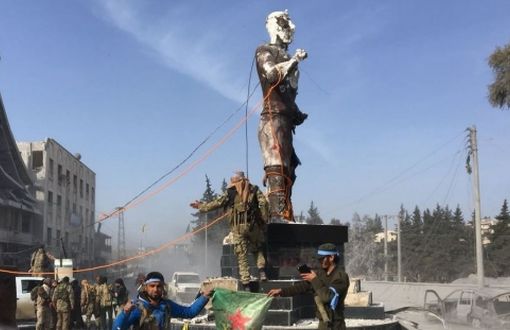
Turkish-allied Syrian rebel militia destroying the statue of Kaveh, a figure of symbolic importance in Kurdish culture
A group of western leftists wrote a letter calling for US intervention on behalf of the PYD in Afrin. Many of these people never noticed the crimes committed by Assad and his allies in the rest of Syria. Many of them slandered the Free Syrian Army as tools of imperialism when they begged (largely in vain) for anyone at all to send them weapons to defend their communities. Some signatories are genocide-deniers. If their engagement with the PYD was in some way critical, and if it was matched by critical solidarity with the larger Syrian revolution, it wouldn’t look so much like fetishisation.
Anyway. I’ve written (in haste – no doubt I’ve missed things out) what I think is a more balanced letter:
We deplore the historical persecution of Kurds (and other minority groups) by regimes in Turkey, Iran, Iraq and Syria. We call on all concerned, in particular the Syrian revolutionary opposition, to unambiguously recognise the Kurdish right to self-determination in areas where Kurds are a majority.
While recognising the extreme difficulty of acting on principle when lives are at stake, we call on both the Syrian opposition and the PYD to carefully consider their alliances with regional and international imperialists. What appears tactically intelligent may turn out to be strategically disastrous.
We condemn the Turkish state’s self-interested intervention in Kurdish-majority Afrin, as we condemn the self-interested interventions of Russia, Iran and the United States in other parts of Syria.
Arise
 I talked to Bill Fletcher on his WPFW show ‘Arise’ about the Syrian Revolution, the current state of the various wars born out of Assad’s war on the people, the west’s role, and western cultural myopeia.
I talked to Bill Fletcher on his WPFW show ‘Arise’ about the Syrian Revolution, the current state of the various wars born out of Assad’s war on the people, the west’s role, and western cultural myopeia.
You can listen to it here. And you can read a transcript of my comments at News of the Revolution in Syria.
